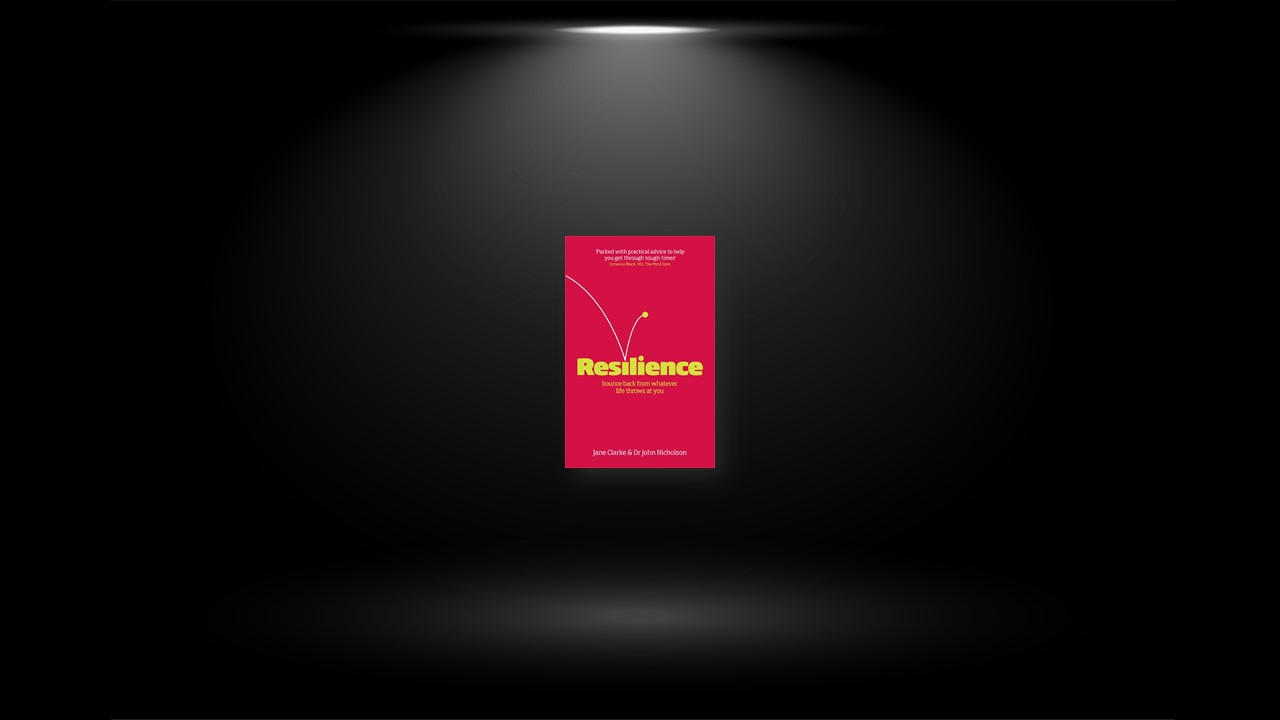Resilient self – self-esteem and self-efficacy
Self-esteem’ has been defined in many ways since first being coined by the English poet John Milton back in the 17th century, but here we link it to an individual’s feeling of self-worth. Self-efficacy, on the other hand, relates to an individual’s belief in their ability to achieve their aims. ‘What am I worth?’ is clearly a different question from ‘How likely is it that I will succeed?’ However, the terms are sometimes used as if they were interchangeable.
the overlap represents pure, unswerving self-belief – not necessarily that the individual can achieve anything, but that they can achieve anything that is a reasonable stretch for them if they really put their mind to it. In the words of one interviewee: ‘It’s toughness and calmness, triggered by inner confidence. You know you’re capable of doing whatever it is you are there to do.’
SELF-ESTEEM
In order to demonstrate resilience, you need a reasonably high level of self-esteem. You have to feel a sense of self-worth and self-regard in order to have belief in your own abilities (self-efficacy). Without this, you will struggle to find the necessary confidence and drive to bounce back from challenging situations. However, it is not enough to have occasional access to high self-esteem; you need to have it permanently ‘on tap’ if it is to constitute a stable resource.
SELF-EFFICACY
People with high self-efficacy are more likely to be excited by challenges and view difficult tasks or situations as diversions rather than roadblocks; they are not knocked off course easily. Undaunted by the unknown, they take a broad view of the task in hand in order to establish the best way forward. And they demonstrate significant tenacity in dealing with problems. People with lower self-efficacy, on the other hand, assume that tasks are harder than they are; they worry about encountering failure rather than focusing on achieving success. They may prepare thoroughly, but since they tend to take a narrow (and sometimes short-sighted) view of a challenge, their planning is not always focused on the right priorities. When life throws you a curve ball, self-efficacy is one of the most important personal resources to have at your disposal.
Can do, will do – optimism and opportunism
Something’s gone wrong – really wrong. What’s your first thought? What’s your initial reaction? What does your instinct tell you? Do you ‘catastrophize’, constructing a worst-case scenario and mapping out all the grisly consequences? Or are you instantly on the lookout for ways of reframing the situation, for your own and other people’s benefit, in a way that transforms enforced change into an opportunity for improvement?
Optimism is about seeing the ‘glass half full’, about always looking for (and usually finding) the silver lining in even the darkest cloud. Optimism encourages people to feel positive about themselves, about other people and about the world’s general direction of travel. Optimists believe that things are getting better all the time, and not necessarily just for themselves, but for others close to them and for society in general. Optimists are therefore likely to view change positively, and to be more confident about what the future holds – and that they will be able to cope with it.
Sales people are famous for their optimism, seeing each rejection as taking them one step closer to achieving their next sale. Contrast this with the concept of ‘psychological conservatism’, which is defined as anxiety in the face of uncertainty – ‘I don’t know what’s going to happen next and because of that I’m very nervous’. Resilient people are generally positive, even happy-go-lucky; they usually thrive on uncertainty and the opportunities it brings.
Opportunism is ‘opportunity plus…’ Confronted by even the blackest of clouds, the opportunist doesn’t just see the silver lining, they use it to mint coins! Opportunism in the context of resilience is about identifying the opportunities that arise as a direct result of whatever has gone wrong. Linked with the creative thinking that enables the optimist to see things in a different light, opportunism is all about seeing how adversity can be turned to advantage – spotting the opportunity, and then making it happen.
Consider the following scenario. Your trusted nanny declares that she is leaving at the end of the month. The pessimist would go into a state of depression, certain that the children will react badly, and that the replacement will be inferior. The optimist would be certain that things will work out well – and take steps to ensure that they do. The opportunist would think about how the situation could be capitalized upon. They would see a chance to get someone even better in place. They might also decide that the time was right to switch from a nanny to an au pair, reducing their outgoings considerably and getting someone who would also do the cleaning and provide cover at all times.
At work, when redundancies are in the offing, the pessimist is deflated and downcast, certain that their head is going to be on the block. By contrast, the optimist feels confident that the value they add will protect them from the axe – and even if they are made redundant, that they’ll have no difficulty finding a new position. The opportunist may go further, perhaps volunteering themselves for redundancy if the package is generous enough; they might even sell their services back to the company that has made them redundant (on a part-time basis, of course, while they set up their own business!). Winston Churchill put the difference succinctly: ‘A pessimist sees the difficulty in every opportunity, an optimist sees the opportunity in every difficulty.’
Leave it to me – taking control
The ability to take control of situations was the factor most frequently mentioned during our research into resilience. Almost everyone we spoke to said how important they thought it was to be in control of events, rather than to be at the mercy of other people’s whims or circumstances they were powerless to affect. Being able to respond to changing events is at the heart of resilience.
Looking first at circumstances, if being in control is an important factor in determining levels of resilience, this might lead some to think that, in order to be resilient, you also need to be a megalomaniac – power-hungry and autocratic. But this is far from the case. Most of the people
drew a clear distinction between being in control and controlling. When we talk about control, we are not talking about micromanaging all aspects of a situation, or about being overly directing to the point of being dictatorial. Instead, taking control means:
- Quickly turning your attention to what can be done to remedy any problem
- Focusing on the positive actions required rather than how unfair or difficult a situation is
- Being proactive – not waiting for others to sort matters out for you
- Securing the necessary resources to put things right; delegating where appropriate
- Influencing others around to your way of thinking
- Being a positive role model
Our ability or desire to take control stems from what psychologists call our ‘locus of control’ (‘locus’ being the Latin word for place).
If you have an external locus of control, this means that you believe you are driven by external events and other people, and that, in reality, you have little influence over what happens. You tend to worry about events which are outside your control, complaining about how unfair things are and envying the ‘good luck’ of others. People with an external locus of control tend to become very reactive and negative, prone to whingeing and bitching about others. With only a finite amount of time and energy available to us all, these people inevitably achieve a lot less, and take far longer to bounce back from tough times.
By contrast, if you have an internal locus of control, you feel confident that you can exert significant influence over your own destiny, through your actions and beliefs. Your focus then is on what you can do to achieve a positive result, not on what you can’t. People with an internal locus of control may say that they are lucky, but in reality they make their own luck. They are proactive and focused on making a difference. They spend their time and energy on reaching defined goals.
No worries – dealing with stress and anxiety
If resilience is about bouncing back, regaining your original shape after having been pulled in all directions, stress is a force which, if not handled well, can seriously distort you – temporarily or permanently. The ability to identify, and then deal effectively with, stress is a key characteristic of resilient people.
Up to a certain level, stress is a positive, motivational force – an energizer which encourages us to act, to confront issues and achieve. Dr Hans Selye, a pioneer in the study of stress, discovered that stress differs from other physical responses in that its effect is the same regardless of whether the stimulus is positive or negative. In other words, you can experience the same feeling whether you receive good news or bad. The physiological symptoms of nervousness are exactly the same as those of excitement. Selye termed negative stress ‘distress’, while he coined the term ‘eustress’ to describe the stress that motivates and inspires us.
As individuals, it would be very helpful if we knew the exact point at which our eustress tips over into distress, but, unfortunately life doesn’t organize itself so conveniently. We all have different tipping points, in the same way that we are all stressed by different things and react in different ways. However, it is fair to say that those who are highly resilient manage stress better than others; they take it in their stride. Most of the resilient people liked being kept busy – juggling different priorities, remaining active in order to achieve what they achieve. If anything, they were more comfortable with having a bit too much to handle than with a relaxed, doable workload.
Interestingly, many of the resilient people appear to take so much in their stride that they believe themselves to be stress-free, although to others, looking on, they seem to be operating under immense stress. Indeed, it is very unusual for these people to be debilitated by stress, and in the rare circumstances when it does happen, they understand how to minimize its effects
Instead of being weakened by stress, these people actually find that:
- Crisis brings out the best in them.
- They are able to turn disaster into success, and have confidence in their ability to do so; they are not ground down by stressful situations.
- They take control because they’re confident and secure, turning their thoughts immediately to what can be done to put things right and fully expecting a positive outcome.
- They are curious, which means that they try different things. They understand that there are risks in not taking risks.


